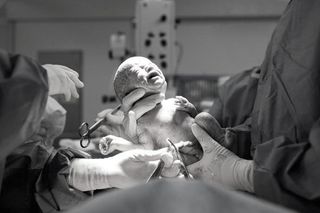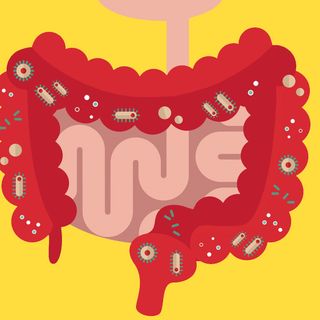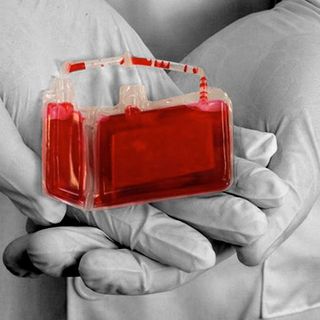
Vaginal Swabbing During C‑Sections May Not Be Transferring Healthy Microbiome to Babies
Antibiotics are the more likely reason C-section babies have altered microbiomes.

For several years, doctors have known about the vital importance of the infant microbiome — the collective term for all the microbes that live in and on the human body and help it function — in determining future health and immunity. And doctors and researchers have also known that for some reason, babies born vaginally have healthier microbiomes and suffer less from allergies, asthma, and other long-term health issues than babies born by C-section. The working theory was that babies passing through their mother’s vaginal fluids would be coated in microbes that would populate their healthy microbiome. Many hospitals in some parts of the world began offering so-called “vaginal seeding,” in which cesarean-delivered babies are immediately swabbed with the mother’s vaginal fluids — in order to bestow on them the benefits of having come into contact with the necessary microbes. The problem is, the practice has now been declared unjustified and potentially unsafe in a new critical review of scientific literature.
Researchers still believe that differences between the microbiomes of cesarean- and vaginally born babies account for the greater risk of health problems suffered by cesarean-born babies in later life. However, the study, published in Frontiers in Medicine, attributes this difference as most likely caused by the antibiotics administered to mothers during C-section deliveries, rather than lack of exposure to vaginal microbes.
Other factors that likely define the microbial phenotype of C-section babies are: Breastfeeding duration (because the microbiome is further transferred and developed during breastfeeding), maternal obesity (and overall health) and age at birth.
“After reviewing the scientific evidence, we find no support for the ‘bacterial baptism’ hypothesis,” says Lisa Stinson, who completed this analysis at the Division of Obstetrics and Gynecology, The University of Western Australia. “While we know that cesarean delivery impacts the infant microbiome, it’s very unlikely these differences are caused by a lack of exposure to vaginal microbes at birth.”
Babies born by cesarean section are at greater risk of suffering from asthma, allergies, autoimmune disorders and obesity in later life, which have been related to differences in a baby’s microbiome — the microorganisms associated with its skin, mouth, nose and gut.
“My research involves working with a lot of mothers who are delivering by C-section and some mothers show an interest in vaginal seeding after reading about it on the internet. Understandably, they want to give their babies the best start in life and on the surface this practice makes sense,” Stinson explains. “But there are certain risks, such as unintentionally transferring dangerous bacteria or viruses to the newborn, so we wanted to find out if these risks were justified.”
Stinson performed a thorough review of research detailing bacterial populations associated with newborns, how these change from when the baby is born, and whether there were differences associated with the mode of delivery or other factors such as antibiotic administration, breastfeeding and age at birth.
Surprisingly, she found that passing through the vagina, alone, was not determinative of the babies’ microbiome.
“If passage through the vagina seeded babies with vaginal bacteria, we would expect to find these bacteria in babies born this way, but this is not the case. Microbes thrown out of balance in babies born by C-section are very similar to those thrown off balance in babies born to mothers receiving antibiotics but delivering vaginally. It is likely that routine antibiotic administration given to mothers delivering by C-section is a major underlying problem,” explains Stinson.
“Mothers delivering by C-section are also more likely to be obese, have less breastfeeding success and give birth at an earlier gestational age, which can also account for differences in bacterial populations.”
Stinson found only one study had evaluated vaginal seeding — and this had failed to prove the effectiveness of the practice.
“Our review is useful to new mothers who are concerned about delivering by cesarean section. Hopefully it will make them think twice about vaginal seeding, a process that can potentially introduce dangerous infections. It is also useful for clinicians, as they can show there is a lack evidence to support this practice.”
Stinson hopes that future research will find ways to intervene early in life or even before birth, to optimize the development of good bacteria in newborns.
“Early life is a critical time for the development of our microbiomes and it can have long-lasting effects on our health. I’m looking forward to larger and more robust studies of the fetal and newborn microbiomes. We may yet find ways to manage our microbiomes for life-long health.”
Related


The Gut Microbiome Differs Between Urban and Rural Populations
